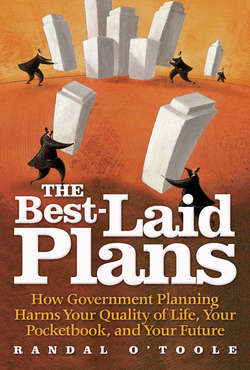Читать книгу The Best-Laid Plans - Randal O'Toole - Страница 21
На сайте Литреса книга снята с продажи.
Planners have no better insight into the future than anyone else.
ОглавлениеSo government plans written today are unlikely to make any sense to the people in the future that the plans are supposed to benefit. Imagine, for example, writing a 50-year plan for your city in 1950. In 1950,
• few people had ever flown, and no one had ever flown in a commercial jet;
• few people had ever worked with computers, and not even the most far-seeing science-fiction writers had predicted microcomputers or the Internet;
• few people could afford to regularly make long-distance phone calls, and no one had ever made a direct-dial long-distance call;
• few married women worked, and the highest-paid jobs were all held by men; and
• few other countries could match the United States as a manufacturing powerhouse, and no one had ever imported a transistor radio from Japan, Korea, or China.
With the information available in 1950, your plan for the year 2000 would make the airport too small and the train station too big. You would assume that high telecommunication costs would force jobs to cluster tightly together. Because you would assume that few married women would work, the homes you would plan would have one-car garages. You would plan for the wrong ratio of blue-collar to white-collar jobs, and you would never imagine that large numbers of people would want a home office.
Although planners cannot truly know the future, they rely on forecasting to provide projections about future populations and demand for various goods and services. Forecasting is generally based on projecting current trends into the future while taking into account demographics—for example, aging baby boomers—and other changes that planners think they can foresee.
Planning forecasts can be very intimidating. But “the technical complexity of forecasts is in fact quite misleading,” says University of California planning professor Martin Wachs. “While equations, computers, and enormous data bases give the forecasts an aura of ’science,’ which invests them with certain authority in the political arena, the most critical data needed to make a forecast often consists of assumptions about the future.” These assumptions, Wachs admits, “can never be known with certainty.”9
Wachs adds, “Forecasters are usually drawn from the ranks of social scientists, engineers, and planners whose education and professional identities are based primarily on technical methodological skills.” While we can train these people to run complicated computer models, “we don’t—and probably can’t—educate them to make better assumptions.”10
Since the forecasts are very sensitive to these assumptions, it is easy for elected or politically appointed officials to “cook the books” by directing planners to use particular assumptions. The apparent complexity of forecasting, says Wachs, is often used to “hide from the public the fact that the assumptions included in the forecast can be selected to help advocate certain courses of action for political purposes.”11 “A wise colleague has pointed out to me,” continues Wachs, “that politicians who agree with her recommendations have never challenged her assumptions, while those who oppose her recommendations almost always challenge her assumptions.”12
Planners’ inability to see the future might not be fatal if plans can be easily revised to account for unforeseen changes. But changing plans that take years to write is slow and tedious. Moreover, any plan will favor certain groups over others, and the favored groups will work especially hard to prevent any changes, no matter how sensible they may be.
Contrary to the quaint belief of Kenneth Arrow’s commanding general, planning is the wrong response to uncertainty about the future. If “the only certainty about the future is that the future is uncertain,” says Harvard economics professor Stephen Marglin, “if the only sure thing is that we are in for surprises, then no amount of planning, no amount of prescription, can deal with the contingencies that the future will reveal.”13
